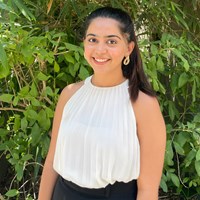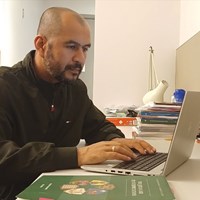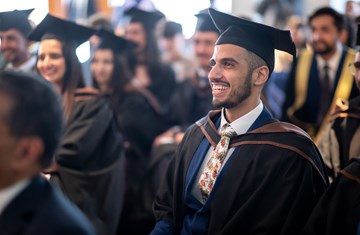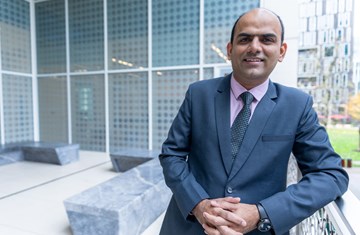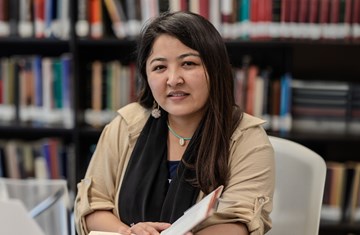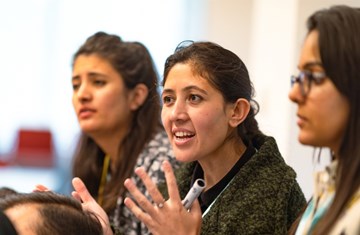A wise insight to the STEP induction week at IIS
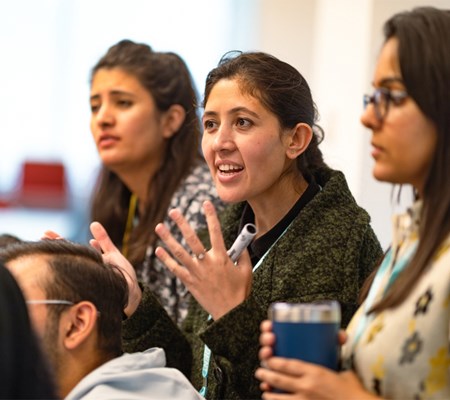
STEP students from Cohort 16
During August-September ‘23, The Institute of Ismaili Studies welcomed our new cohort of students with a series of sessions that included the following topics:
- Understanding the vision and mission of the Institute.
- Examining the philosophy and a detailed structure of the Secondary Teacher Education Programme.
- Introduction to well-being as one settles down in a new learning environment.
- City Challenge: A fun based activity to explore the city.
- An intellectually engaging and socialising trip to Rochester
As students embark upon their learning voyage some of them have shared their expectations from the programme and written a note to their future self which they may want to reflect upon towards the end of the programme.
Given below are some responses from the new cohort STEP-2025:
Sara Charania (Mozambique)
I'm a resolute and enthusiastic person whose path has been influenced by a deep commitment to positively impact the futures of young students in Mozambique. The shortage of well-qualified STEP instructors in Mozambique, and the pressing need for quality education in the nation were the primary motivators behind my choice to enrol in this programme. My aim is to contribute to bridging this gap and offering stability, equality, and knowledge to the children of Mozambique, enabling them to respond to from the unpredictability of not knowing who will lead their next class or what the subject matter will entail.
Islamic Studies, particularly in the context of interfaith dialogue, greatly intrigues me. In today's interconnected world, fostering tolerance and peaceful coexistence demands an understanding of diverse religions and worldviews.
It deepens my personal grasp of my faith, its history, and teachings, providing a valuable perspective on spirituality and coexistence.
My motivation to follow this path was sparked by a STEP teacher's visit to our camp, offering a glimpse of appropriate classroom practices, highlighting the stark contrast to Mozambique's educational landscape. This experience kindled a fervour within me to enhance the educational prospects for children in my homeland.
After being away from my hometown for my education since the 8th grade, I envision reaching my objective of returning to my local community and making a meaningful contribution. As a STEP teacher, my aspiration extends beyond just transmitting knowledge; I aim to evolve and learn alongside my students, fostering a dynamic and enriching educational experience.
As I set out on this adventure, I wish to emphasise to my future self that regardless of any moments of apprehension or feeling daunted, the shift from a background with limited resources to an environment teeming with exceptional professors, vast libraries, and a diverse community of students worldwide will undoubtedly be a profound and life-altering journey.
I hold a strong belief in my capacity to evolve and develop personally, and when the day arrives for me to return home, I will have transformed far beyond the Sara who initially entered this endeavour, marked by feelings of confusion, overwhelm, and trepidation. My commitment to bringing positive change to the education sector in Mozambique and my dedication to fostering interfaith understanding will remain unwavering, driving me forward on this meaningful journey of self-discovery and service.
Ahmed Nayyar (Pakistan)
My name is Ahmed Nayyar. I hail from Hunza, Pakistan and my interest in Islamic Studies grew some years back when I was studying at the University of the Punjab, Lahore Pakistan for an undergraduate study program in Communication Studies. I was new to the city and the people too. I was the only student from a different area outside the province, a person with a less known faith tradition and beliefs for my new friends and class fellows. Having had some knowledge of my own faith, practices, and beliefs, I managed to answer the questions of my fellows. But I was confused as to why these people were always focusing on my beliefs. This was my first encounter with people outside of my hometown.
When I started working with the Jamati Institutions in Hunza, primarily with youth under the umbrella of Aga Khan Youth & Sports Board, my interaction and observation during camps, trainings, and other social activities helped me to realise that there was a limited understanding about their faith, practices, past and beliefs. Due to rapid growth in commercialism in the area, we were more exposed to other communities than ever before. Additionally, some of them went on to continue their further studies in different cities. In such scenarios, I always asked myself how I can help these young people to contributing to nurturing the formation of identity.
This was the time when, a window was opened for me, and a friend of mine introduced me to IIS’s STEP. I was fascinated by the aims and objectives of the programme. The courses from leading universities in the diverse city of London really inspired me. The STEP curriculum itself was a great inspiration. The pedagogies, curriculum, and content material which was in the eight STEP modules were what I had missed in my adolescence. I am here because of the support and inspiration that STEP teachers are rendering in their respective areas.
My expectations are to be a contributor to the STEP. For my dissertation project, I am keen to investigate the impact that the IIS curriculum has had in my own area.
In the long run, I see myself in academia or somewhere supporting the young pupils to respond to contemporary challenges faced by communities considering their own traditions. I already feel overwhelmed by the valuable support of the IIS team and all around us who are working to make the wishes of His Highness come true.

